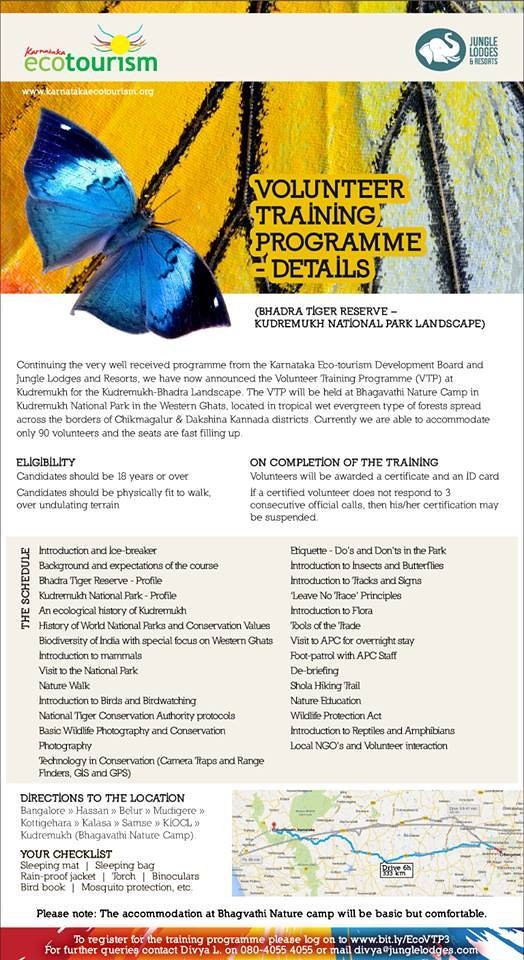Wildlife Volunteers Training Program (VTP), Kudremukh, Karnataka, 18-24th May /25th-31st May, 2014
The Wildlife Volunteers’ Training Program (VTP) is a week-long accreditation program to train volunteers for censuses and other structured field initiatives in Karantaka. There was one program in the Bandipur range in 2013 (in 4 batches) , and another in the Dandeli range in Feb/March 2014 (in 2 batches). The camp in the Kudremukh range (2 batches) will be conducted at the Bhagavathi Nature Camp, at Kudremukh, Karnataka.
Bhagwathi Nature Camp, Range Forest Office, Wildlife Range, Kudremukh Division, Chikmagalur Dist., Karnataka - 577142 Phone Number: 08263 - 255998 Contact Person: Mr Harish, +919480736064
One batch is starting on the 18th of May, and the next on 25th of May. The fees are Rs.5500 for tent accommodation and Rs.3300 for dormitory accommodation.
The Program is at the Bhagavathi Nature Camp, Kudremukh, Karnataka.
It starts on Sunday noon and ends on Saturday around 2 pm, after lunch. The present batches start on the morning of 18th May and 24th May.
The fees are Rs.5,500 for tent accommodation, and Rs.3,300 for dormitory accommodation.
At the moment of writing, seats are available in both batches.
- Travel: What are the travel options to get there?
a. Kalasa is the nearest place. It is a town about 15 km from the camp. Eco-volunteers can get participants picked up from here.
(Deepa’s note: The KSRTC Volvo Airavat bus from Bangalore to Kalasa on the 17th is full.However, as of now,the Rajahamsa Executive buses to Kalasa, leaving at the same time and arriving in Kalasa at the same time, have seats available.
The return bus on the 24th night has seats available, and I have not checked for the outward journey on the 25th or return on the 31st.)
Other options:
b. Take an overnight bus from Bangalore to Karkala (buses to Kundapur and Dharmasthala pass through Karkala). Karkala is 50 km. away. Take a cab (or a bus if available, which will get you there in time) to Kudremukh.
c. Take an overnight bus from Bangalore to Mangalore, 100 km away. Take a cab (or a bus if available, which will get you there in time) to Kudremukh.
d. Drive down from Bangalore the day prior to the start of the program.
- What will the weather be like? (For clothing)
Warm to hot with some pre-monsoon rains maybe. Bring a raincoat or an umbrella.
- What are the facilities available at the Nature Camp? Are there beds in the tents and in the dormitories, or should we bring sleeping bags?
4b.Will food be provided?
Beds are provided but getting sleeping bags would be good..can be used in the Anti Poaching Camp.
Food would be provided, of course!
- Is there electricity? Can we charge our phones and other gadgets?
Generator would be run during class room sessions…and for some time in the evening.
- Is there mobile connectivity at the camp? If so, which service providers (BSNL, Vodaphone, Airtel) ?
BSNL mobiles may work near the main gate and a few spots in the camp. Otherwise there is no mobile or internet connectivity. Be prepared for a week away from the world!
- Are the toilets Western or Indian? Do the tents have attached toilets? Is there any water shortage?
Tents have attached toilets..but not sure if they are Indian or western.
- Will there be hot water available for bathing?
No. Ordinary water, yes.
- How many days will be spent at the Anti Poaching Camp?
One night’s stay only. The next day (the penultimate day) there is a long walk..between 10-15 kms.
- Is there any indemnity bond that we have to sign?
Yes.
- What is the nearest emergency medical centre, in case of need?
Kalasa is the nearest town. The Camp will have a basic first-aid kit.
12.What is the checklist of things that one has to bring?
a. Dull (brown, dark green, black)-coloured clothes, with 2 change of clothes at least b. Sturdy walking shoes and socks c. Hats/caps d. Backpacks with water bottles. e. Insect repellent (leech bites rare unless it rains, but tick bites are likely). Linseed or neem oil seems to be effective. f. Sleeping bags for the Anti-Poaching Camp stay (one night) g. Binoculars h. Rechargeable torches. i. Multi-point boards to recharge gadgets (cameras, torches) when the generator is running. Chargers for phones and any gadgets. (I have bought a rechargeable lamp at Decathlon, for example). j. Towels/Soap/Hairwash/and Talcum powder in the hot season. k. Any field guides l. Cameras (optional) m. Any medication required on a daily basis, paracetamol, and anti-diarrhoea medication. n. Rain-proof jacket/ Leech socks IF it is the monsoon season. o. Laptops (optional) to download photos, write accounts of the trip, to be charged when the generator is running. p. Keen enthusiasm for the program, and to share experiences with fellow-participants. q. Anything else the participant considers essential.
Here is wildlife photographer (
For more information, contact:
Please contact Divya at
divya@junglelodges.com
Ph. 80 4055 4055 (JLR)
for any further queries.
Deepa Mohan: mohandeepa@gmail.com Sarath Champati: kabiniman@yahoo.com Vijay Mohan Raj, IFS: vijay@junglelodges.com

